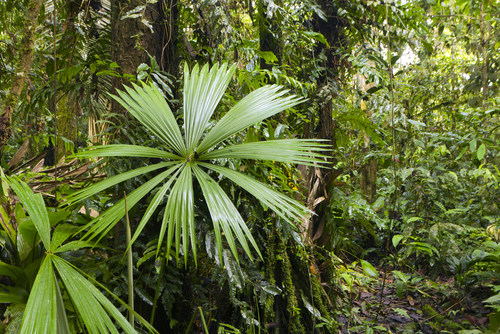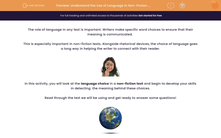The role of language in any text is important. Writers make specific word choices to ensure that their meaning is communicated.
This is especially important in non-fiction texts. Alongside rhetorical devices, the choice of language goes a long way in helping the writer to connect with their reader.

In this activity, you will look at the language choice in a non-fiction text and begin to develop your skills in detecting the meaning behind these choices.
Read through the text we will be using and get ready to answer some questions!

Nature is a priceless treasure that we must protect for the sake of our planet and future generations. The Earth's ecosystems provide us with clean air, fresh water, food, and countless resources, making life as we know it possible. However, in recent years, human activities have put enormous strain on the environment, leading to habitat loss, species extinction, and climate change. To ensure a sustainable future, it is imperative that we take immediate and meaningful action to protect and preserve nature.
Biodiversity is the variety of life on Earth, encompassing all species of plants, animals, and microorganisms. Each species plays a unique role in the ecosystem, contributing to the balance and stability of our planet. When we protect nature, we safeguard biodiversity, ensuring that ecosystems function as they should. Biodiversity is essential for everything from pollinating our crops to purifying our water and regulating our climate.
Nature is one of our most potent allies in combating climate change. Forests, wetlands, and oceans act as carbon sinks, absorbing and storing vast amounts of carbon dioxide from the atmosphere. By conserving and restoring these natural systems, we can slow down the pace of global warming and reduce the associated extreme weather events and rising sea levels.
Forests, particularly, are vital in providing us with clean air. Trees absorb carbon dioxide and release oxygen, making the air we breathe healthier. Additionally, natural ecosystems, such as wetlands and rivers, help filter and purify our water supply. Without nature, the quality of our air and water would decline, putting our health and well-being at risk.
Nature also provides numerous economic benefits. Tourism, agriculture, and fisheries all rely on healthy ecosystems. Conserving nature is not just a moral obligation; it is also an investment in our economic future. Destruction of natural habitats can lead to economic losses due to reduced agricultural productivity, increased healthcare costs, and damage to infrastructure.
Many of the drugs and medicines we use today are derived from natural compounds found in plants and animals. Protecting nature ensures the preservation of potential life-saving discoveries. It is estimated that up to 70% of new cancer drugs are derived from natural sources.
It is vital that we learn the importance of protecting the natural world. Without help, the dangers facing our environment could overwhelm it, leaving our grandchildren with a devastating legacy. We have a collective responsibility to the future to preserve and protect this planet for the generations to come.









